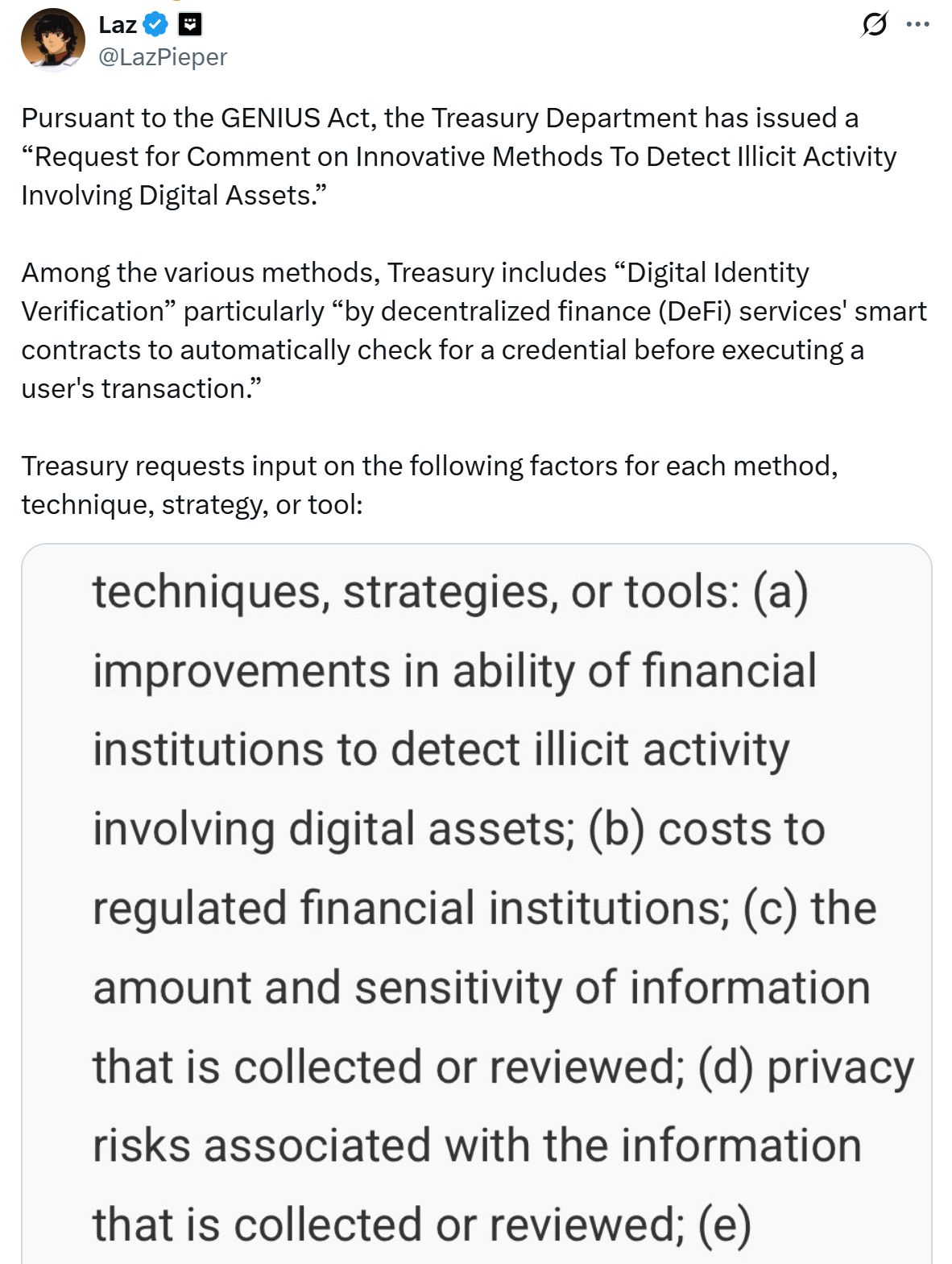US Treasury weighs digital ID verification in DeFi to tackle illicit finance
The US Department of the Treasury is seeking public feedback on how digital identity tools and other emerging technologies could be used to fight illicit finance in crypto markets, with one option being embedding identity checks into decentralized finance (DeFi) smart contracts.
The consultation, published this week, stems from the newly enacted Guiding and Establishing National Innovation for US Stablecoins Act (GENIUS Act), signed into law in July.
The Act, which sets out a regulatory framework for payment stablecoin issuers, directs the Treasury to explore new compliance technologies, including application programming interfaces (APIs), artificial intelligence, digital identity verification and blockchain monitoring.
One of the ideas in the request for comment is the potential for DeFi protocols to integrate digital identity credentials directly into their code. Under this model, a smart contract could automatically verify a user’s credential before executing a transaction, effectively building Know Your Customer (KYC) and Anti-Money Laundering (AML) safeguards into blockchain infrastructure.

Related: GENIUS Act to spark wave of ‘killer apps’ and new payment services: Sygnum
Treasury: digital IDs could cut compliance costs
According to Treasury, digital identity solutions, which may include government IDs, biometrics or portable credentials, could reduce compliance costs while strengthening privacy protections.
They could also make it easier for financial institutions and DeFi services to detect money laundering, terrorist financing, or sanctions evasion before transactions occur.
Treasury also acknowledged potential challenges, including data privacy concerns and the need to balance innovation with regulatory oversight. “Treasury welcomes input on any matter that commenters believe is relevant to Treasury’s efforts,” the agency wrote.
Public comments are open until Oct. 17, 2025. Following the consultation, Treasury will submit a report to Congress and may issue guidance or propose new rules based on the findings.
Related: GENIUS Act yield ban may push trillions into tokenized assets — ex-bank exec
US banks warn against stablecoin yield loophole
Last week, several major US banking groups, led by the Bank Policy Institute (BPI), urged Congress to tighten rules under the GENIUS Act, warning that a loophole could let stablecoin issuers bypass restrictions on paying interest.
In a letter sent Tuesday, BPI said the gap could allow issuers to partner with exchanges or affiliates to offer yields, undermining the intent of the law. The group cautioned that unchecked growth of yield-bearing stablecoins could trigger up to $6.6 trillion in deposit outflows from traditional banks, threatening credit access for businesses.
Magazine: Bitcoin vs stablecoins showdown looms as GENIUS Act nears
Disclaimer: The content of this article solely reflects the author's opinion and does not represent the platform in any capacity. This article is not intended to serve as a reference for making investment decisions.
You may also like
Interop roadmap "accelerates": After the Fusaka upgrade, Ethereum interoperability may reach a key milestone
a16z "Big Ideas for 2026: Part Two"
Software has eaten the world. Now, it will drive the world forward.

When the Federal Reserve "cuts interest rates alone" while other central banks even start raising rates, the depreciation of the US dollar will become the focus in 2026.
The Federal Reserve has cut interest rates by 25 basis points as expected. The market generally anticipates that the Fed will maintain an accommodative policy next year. Meanwhile, central banks in Europe, Canada, Japan, Australia, and New Zealand mostly continue to maintain a tightening stance.

From MEV-Boost to BuilderNet: Can True MEV Fair Distribution Be Achieved?
In MEV-Boost auctions, the key to winning the competition lies not in having the most powerful algorithms, but in controlling the most valuable order flow. BuilderNet enables different participants to share order flow, reshaping the MEV ecosystem.

